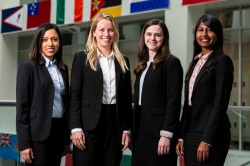MBA Team Wins First at National Supply Chain Competition
PROVO, Utah – Mar 21, 2019 – An all-women’s all-star BYU Marriott MBA team won first place on 23 February in a Texas Christian University supply chain case competition. The team drew from the raw talent that the BYU School of Business MBA program had to offer—bringing together individuals with the capability to beat out fourteen other competitors and win $10,000.
Last November, Scott Webb, a marketing and global supply chain assistant teaching professor at BYU Marriott, put the team together. Webb chose second-year MBA student Elise Hardle, from Provo, who had competed in the competition in 2018 as a first-year student to be the captain of this year’s team. From there, the two of them worked to create a team of the best of the best. “I am fortunate because I am the advisor for the Savage Scholar Program, a global supply chain management program,” says Webb. “Being an advisor allowed me to see students perform consulting studies for an extended amount of time, and I was able to identify certain attributes in students that would work well on a team.”
Observing the MBA students in their element gave Webb a good idea of who would be a great asset to the team. He recommended Reenu Raj, from Bangalore, India, and Paige Woodward, from Salt Lake City, to Hardle because of their analytical and presentation abilities. Webb then advised the team of three that someone with a strong background in finance would be advantageous. They quickly identified Fernanda Sayavedra, from Mexico City, as a possible team member. She agreed and was brought on. The team was now complete and ready to get to work.
The team members' best preparation for the competition came from their normal MBA program course classes. In addition, Webb provided a brief training about nonverbal communication, timelines for working on the case, and how to structure the question-and-answer portion of the case. “They had the slide presentation templates ready,” says Webb. “They had coordinated what they were going to wear and had discussed in great detail what roles each person was going to take on the team.”
The team trusted in each other and were ready for the competition. “We had so much confidence in this team and skill sets we were bringing to it,” says Raj.
The competition officially started at 8:50 a.m. on 22 February, and ended exactly twenty-four hours later. The team received a case with a problem statement regarding same-day delivery of apparel products to a broad area of customers in a large metropolitan area. They were put in a hotel room for brainstorming and weren’t allowed to consult with anyone outside of the team. The next day, the team had to submit and present its best recommendations to solve the problem. Their goal was to back up each recommendation with research, proving whether or not the solution they were proposing was actually viable. “It’s easy to come up with recommendations, but it’s hard to make them realistic,” says Hardle.
The team jumped right into the problem and worked feverishly to address the obvious and nuanced issues. “We became a well-oiled machine,” says Reenu. “The comfortable environment allowed us to get a lot of work done quickly.”
The women quickly developed a productive work flow and took on problem after problem as time ticked away. “I was shocked by how fast the time went by,” Woodward says. “But we were constantly working and getting a ton done during the time.”
When the time was up, with less than three hours of sleep, the team presented their findings. For twenty-five minutes, they explained their best solutions to a panel of seven judges who were supply chain executives from major corporations. The women found they made it to the final round with four other teams, and then presented again.
When the winner was announced a couple hours later, the team was relieved to hear their name called. “After working so hard and being so tired, finding out we won was definitely a payoff,” says Hardle.
The payoff was significant in more ways than one. “I don’t think the corporate sponsors were used to having an all-women team because the shirts they gave us were extra-extra-large,” says Sayavedra. The four BYU Marriott representatives were the only all-women team at the competition, but for them, that was just happenstance.
“It’s cool the team was all women, but it wasn’t the key factor of our success,” says Hardle. “We didn’t put this team together thinking it would be an all-women team. We just wanted the right skill sets.”
Webb recognizes that the reason this team won was because they were a team. “This team personifies the BYU Marriott MBA program—they have incredible skills and are well trained,” says Webb. “However, their best trait is that they are able to communicate and relate well with each other. Business is a team sport, and this was an exceptionally good team.”
Media Contact: Chad Little (801) 422-1512
Writer: Maren Cline




